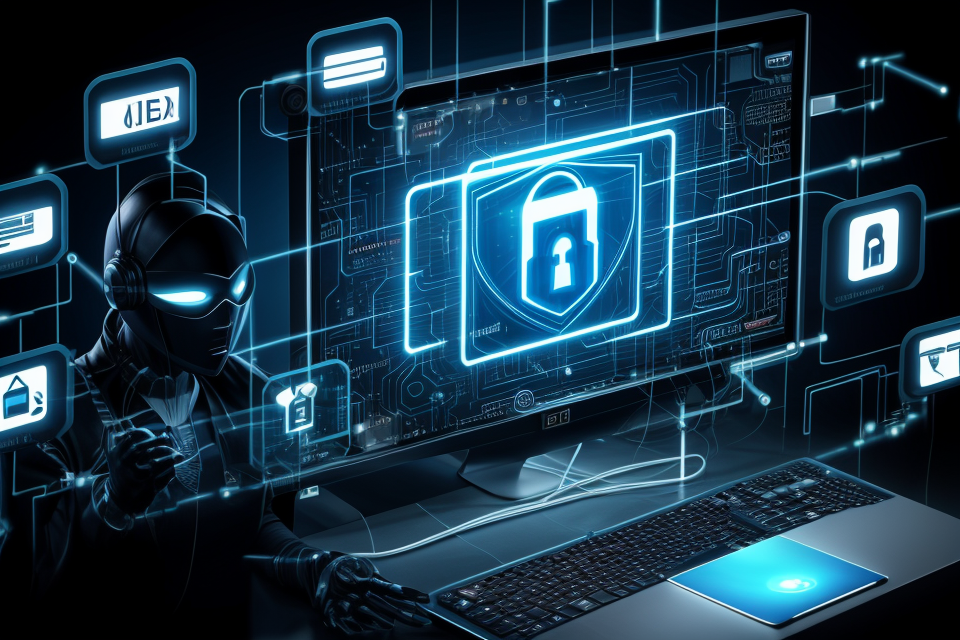As technology continues to advance and play an increasingly central role in our lives, the importance of cybersecurity cannot be overstated. With more and more of our personal and professional data being stored online, the need for robust cybersecurity measures has never been greater. But will the importance of cybersecurity continue to grow in the future? In this article, we’ll explore the various factors that suggest that cybersecurity will be more important than ever in the years to come. From the rise of new technologies to the ever-evolving threat landscape, we’ll examine why cybersecurity is poised to become an even more critical issue in the coming years.
The Evolution of Cybersecurity
The Emergence of Cyber Threats
As technology continues to advance, so do the methods and tools used by cybercriminals to exploit vulnerabilities in computer systems and networks. The emergence of cyber threats has become a significant concern for individuals, businesses, and governments alike.
The Growth of Cybercrime
Cybercrime has grown in both frequency and sophistication, with attackers targeting individuals and organizations across a range of industries. Financial cybercrime, which includes activities such as hacking into bank accounts and stealing credit card information, has become increasingly common.
In addition to financial cybercrime, cyber espionage and intellectual property theft have also emerged as significant threats. Nation-states and criminal organizations are now capable of stealing sensitive information, such as trade secrets and confidential business data, at an unprecedented scale.
The Increasing Sophistication of Attacks
As cyber threats continue to evolve, so too must the defenses against them. Attackers are becoming more sophisticated in their methods, utilizing advanced techniques such as Advanced Persistent Threats (APTs) and ransomware attacks to gain access to sensitive information.
APTs are long-term, targeted attacks that are designed to evade detection and remain undetected for extended periods. These attacks often involve the use of zero-day exploits, which are vulnerabilities that are unknown to the software vendor and have not yet been patched.
Ransomware attacks, on the other hand, involve the encryption of sensitive data and the demand for a ransom in exchange for the decryption key. These attacks can be devastating for individuals and businesses, as they can result in the loss of critical data and the disruption of operations.
In conclusion, the emergence of cyber threats is a significant concern for individuals, businesses, and governments alike. As technology continues to advance, it is essential to stay informed about the latest threats and to implement robust cybersecurity measures to protect against them.
The Expansion of the Internet of Things (IoT)
The Proliferation of Connected Devices
Connected devices have become a ubiquitous presence in modern life, enabling greater convenience and efficiency. Smart home devices, such as thermostats, lighting systems, and security cameras, allow for remote monitoring and control. The proliferation of these devices has also extended to the industrial sector, with IoT technologies being integrated into manufacturing processes, supply chain management, and asset tracking.
Smart Home Devices
Smart home devices, which range from voice assistants to smart appliances, have transformed the way people interact with their living spaces. These devices are often connected to the internet, allowing for seamless integration and remote access. While convenience is a key benefit, it also presents new security challenges. As these devices collect and transmit sensitive data, such as personal information and location data, it becomes crucial to ensure that appropriate security measures are in place to protect users’ privacy and maintain the integrity of their homes.
Industrial IoT
Industrial IoT (IIoT) has the potential to revolutionize manufacturing and industrial processes. By integrating sensors, machine learning algorithms, and data analytics, IIoT can enhance productivity, optimize supply chain management, and improve overall efficiency. However, the adoption of IIoT also brings about new security concerns. With an increasing number of devices connected to networks, there is a greater risk of cyber-attacks, including data breaches, malware infections, and disruption of operations. As such, it is essential to prioritize cybersecurity measures to protect the confidentiality, integrity, and availability of critical infrastructure and data.
The Security Challenges of IoT
Security at the Device Level
The proliferation of IoT devices presents a unique challenge in terms of security. Many of these devices have limited processing power and memory, making it difficult to implement robust security measures. Furthermore, the rapid pace of innovation often results in security being overlooked in favor of other features. This creates a vulnerability that can be exploited by cybercriminals, who can gain access to sensitive data or launch attacks on connected networks.
Network Security and Data Privacy
As more devices are connected to networks, the potential for cyber-attacks increases. Attackers can exploit vulnerabilities in the devices themselves or in the networks they are connected to, potentially leading to data breaches or disruptions in operations. In addition, the vast amounts of data generated by IoT devices can pose a significant challenge in terms of data privacy. Ensuring that appropriate measures are in place to protect sensitive data, such as personal information and confidential business data, is critical to maintaining trust and preventing potential legal and financial consequences.
In conclusion, the expansion of the Internet of Things presents both opportunities and challenges in terms of cybersecurity. As more devices are connected, it becomes increasingly important to prioritize security measures to protect against cyber-attacks and ensure the confidentiality, integrity, and availability of data. This will require a multi-faceted approach, including the development of new security technologies, increased awareness and education, and the establishment of industry standards and regulations.
The Importance of Cybersecurity in the Future
The Increasing Dependence on Technology
The Growing Role of Technology in Business
As technology continues to advance, it is becoming increasingly integral to the operations of businesses across various industries. This has led to the development of new technologies and tools that enable companies to improve their productivity, streamline their processes, and gain a competitive edge in the market. However, this increased reliance on technology also comes with its own set of challenges, particularly in terms of cybersecurity.
E-commerce and Digital Transformation
E-commerce is one of the primary areas where technology has had a significant impact on businesses. With the rise of online shopping, companies have had to adapt to new technologies and platforms to reach their customers. As a result, they have become more vulnerable to cyber threats, such as hacking, phishing, and data breaches. Cybersecurity has become a critical aspect of e-commerce, and companies are investing heavily in it to protect their customers’ data and maintain their reputation.
Cybersecurity as a Competitive Advantage
As cyber threats continue to evolve, companies are recognizing the importance of cybersecurity in gaining a competitive advantage. Companies that prioritize cybersecurity are better equipped to protect their customers’ data, build trust, and differentiate themselves from their competitors. In turn, this has led to an increased demand for cybersecurity professionals and services, creating new opportunities for businesses that specialize in this area.
The Impact of Cybersecurity on Everyday Life
Cybersecurity is not just a concern for businesses; it also has a significant impact on everyday life. As technology becomes more integrated into our daily lives, we are becoming more dependent on it for tasks such as banking, shopping, and communication. This increased reliance on technology has also led to an increase in cyber threats, such as identity theft, phishing, and cyberbullying. As a result, individuals are becoming more aware of the importance of cybersecurity and are taking steps to protect themselves and their personal information.
The Looming Threats to Cybersecurity
The Rise of Nation-State Cyberattacks
In the ever-evolving world of cybersecurity, one of the most pressing concerns is the rise of nation-state cyberattacks. These attacks are perpetrated by nation-states or state-sponsored groups and are often carried out for political or economic gain. The motivations behind these attacks can vary, but they typically fall into two categories: espionage and intellectual property theft, and disruption and infrastructure attacks.
Espionage and Intellectual Property Theft
Espionage and intellectual property theft are becoming increasingly common in the realm of nation-state cyberattacks. Nation-states may target companies or organizations to steal valuable intellectual property, trade secrets, or sensitive information. These attacks can have significant economic consequences, as the stolen information can be used to gain a competitive advantage in the marketplace. Additionally, these attacks can compromise national security by allowing adversaries to access classified information.
Disruption and Infrastructure Attacks
Another growing concern is the rise of disruption and infrastructure attacks. These attacks are aimed at disrupting critical infrastructure, such as power grids, transportation systems, and financial institutions. Nation-states may use these attacks to disrupt the normal functioning of a country, causing widespread chaos and economic damage. For example, a nation-state may target a country’s power grid, causing widespread blackouts and leaving citizens without access to basic necessities like food and water.
The Evolving Nature of Cyber Threats
In addition to nation-state cyberattacks, there are other emerging threats that are shaping the future of cybersecurity. One such threat is cybercrime-as-a-service, which refers to the growing trend of offering cybercrime tools and services to others. This trend has made it easier for less technically savvy individuals to engage in cybercrime, leading to an increase in the number of attacks.
Another emerging threat is AI-powered attacks. As artificial intelligence (AI) becomes more advanced, it is being used to develop more sophisticated cyberattacks. For example, AI can be used to develop more advanced phishing attacks or to more effectively evade detection by security systems. These attacks can be even more difficult to detect and defend against, making them a significant concern for the future of cybersecurity.
The Cybersecurity Arms Race
The Need for a Multi-Faceted Approach
As the cybersecurity landscape continues to evolve, it is becoming increasingly clear that a multi-faceted approach is necessary to address the growing threats. Cyber attacks are becoming more sophisticated, and traditional security measures are no longer enough to protect against them. Here are some of the key areas that must be addressed in order to ensure the continued security of our digital infrastructure.
Strengthening Cyber Defenses
One of the primary areas that must be addressed is the strengthening of cyber defenses. This includes the use of advanced technologies such as AI and machine learning to detect and prevent cyber attacks. In addition, cybersecurity education and training must be improved in order to ensure that employees at all levels of an organization are aware of the risks and can take steps to protect against them. Finally, collaboration between government, industry, and academia is essential in order to share information and resources and develop new technologies and strategies to combat cyber threats.
AI and Machine Learning in Cybersecurity
AI and machine learning are increasingly being used in cybersecurity to detect and prevent cyber attacks. These technologies can analyze vast amounts of data in real-time, identify patterns and anomalies, and alert security personnel to potential threats. By continuously learning from past attacks and adapting to new tactics, AI and machine learning can help organizations stay one step ahead of cyber criminals.
Cybersecurity Education and Training
As cyber threats continue to evolve, it is essential that cybersecurity education and training keep pace. This includes educating employees about the risks of cyber attacks and providing them with the knowledge and skills they need to protect against them. It also involves training security personnel to identify and respond to potential threats and to keep up with the latest technologies and techniques used by cyber criminals.
Collaboration Between Government, Industry, and Academia
Collaboration between government, industry, and academia is essential in the fight against cyber threats. Government agencies can provide valuable information and resources to help organizations protect against cyber attacks, while industry and academia can contribute their expertise and knowledge to develop new technologies and strategies. By working together, these three sectors can create a more comprehensive and effective approach to cybersecurity.
The Role of Ethics in Cybersecurity
Balancing Security and Privacy
In the realm of cybersecurity, there is a delicate balance that must be struck between ensuring the security of sensitive information and protecting the privacy rights of individuals. This balance is further complicated by the various privacy regulations and compliance measures that organizations must adhere to.
Privacy Regulations and Compliance
Governments and regulatory bodies around the world have implemented a variety of privacy regulations to protect the personal data of citizens. For example, the European Union’s General Data Protection Regulation (GDPR) and the California Consumer Privacy Act (CCPA) set strict guidelines for how organizations can collect, store, and use personal data.
Compliance with these regulations can be a significant challenge for organizations, as they must ensure that they are not only protecting the privacy of their customers and clients but also avoiding any potential legal repercussions. Failure to comply with these regulations can result in hefty fines and reputational damage, making compliance a top priority for many organizations.
The Challenges of Secure Data Management
Managing sensitive data securely is a critical aspect of cybersecurity. Organizations must implement robust security measures to protect against cyber threats, such as hacking, malware, and phishing attacks. However, these security measures can sometimes conflict with privacy regulations, making it difficult for organizations to strike the right balance between security and privacy.
For example, implementing strong encryption measures can help protect sensitive data from cyber threats, but it can also make it more difficult for organizations to comply with privacy regulations that require them to make personal data available to individuals upon request. This conflict highlights the complexity of balancing security and privacy in the realm of cybersecurity.
The Ethics of Offensive Cyber Operations
The Use of Hacking as a Defensive Measure
One of the most controversial aspects of cybersecurity is the use of hacking as a defensive measure. Some argue that hacking back against cyber attackers is a necessary defense mechanism, while others believe that it is a violation of ethical principles and could escalate cyber conflicts.
Offensive cyber operations involve hacking into the systems of adversaries to gather intelligence, disrupt their operations, or sabotage their infrastructure. While some countries, such as the United States, have acknowledged the use of offensive cyber operations, others, such as Russia, have been accused of engaging in such activities without officially acknowledging them.
The Debate Over Offensive Cyber Operations
The debate over offensive cyber operations is complex and multifaceted. On one hand, some argue that offensive cyber operations can be an effective deterrent against cyber attacks and can help protect national security interests. On the other hand, others argue that such operations could lead to unintended consequences, such as collateral damage to innocent parties or escalation of cyber conflicts.
Furthermore, there are concerns that offensive cyber operations could undermine the ethical principles of cybersecurity, such as the protection of privacy and the respect for sovereignty. The debate over offensive cyber operations highlights the complex ethical issues that arise in the realm of cybersecurity.
The Future of Cybersecurity: A Call to Action
The Need for a Holistic Approach
In order to effectively address the rapidly evolving cybersecurity landscape, it is essential to adopt a holistic approach that encompasses various facets of cybersecurity. This approach involves collaboration, education, and innovation.
The Importance of Collaboration
Collaboration between various stakeholders is crucial in tackling cybersecurity challenges. Public-private partnerships can facilitate the sharing of information and resources, enabling a more comprehensive understanding of threats and vulnerabilities. Such partnerships can also promote the development and implementation of best practices and standards.
International cooperation is equally important, as cyber threats know no borders. By working together, nations can develop a common understanding of cybersecurity challenges and develop joint strategies to address them. This collaboration can help create a more cohesive global approach to cybersecurity.
The Role of the Individual
The role of the individual cannot be overstated in the context of cybersecurity. As technology becomes more integrated into our daily lives, individuals must be aware of the potential risks and take proactive steps to protect themselves and their devices.
Cybersecurity Awareness and Education
To promote a culture of cybersecurity, it is crucial to raise awareness and educate individuals about the importance of cybersecurity, as well as best practices for protecting personal information and devices. This education should begin at a young age and continue throughout one’s life, with a focus on developing critical thinking skills and fostering a mindset of caution and vigilance.
Developing a Cybersecurity Mindset
In addition to education, individuals must cultivate a cybersecurity mindset that encourages them to think critically about their online activities and the security implications of their actions. This mindset should include regular software updates, strong and unique passwords, and the use of antivirus software.
The Future of Cybersecurity Research and Development
The future of cybersecurity will be shaped by emerging technologies and the need for innovative solutions. As new technologies continue to emerge, it is crucial to conduct research and development in order to identify potential vulnerabilities and develop appropriate security measures.
Emerging Technologies and Cybersecurity
As technologies such as artificial intelligence, the Internet of Things, and cloud computing become more prevalent, it is essential to understand the potential cybersecurity risks associated with these technologies and develop appropriate security measures. This research should involve a multidisciplinary approach, combining expertise from various fields to ensure a comprehensive understanding of the risks and opportunities presented by emerging technologies.
Innovation and the Future of Cybersecurity
Innovation will play a crucial role in shaping the future of cybersecurity. Organizations and individuals must continuously explore new approaches and technologies to stay ahead of emerging threats. This innovation should be driven by a willingness to embrace change and adapt to new challenges, while remaining grounded in the principles of collaboration, education, and a strong cybersecurity mindset.
FAQs
1. Why is cybersecurity becoming more important in the future?
Cybersecurity is becoming more important in the future because technology is advancing at a rapid pace, and with it, the number of cyber threats is also increasing. As more and more people and organizations rely on technology to store and transmit sensitive information, the risk of cyber attacks and data breaches is also increasing. This makes it essential for individuals and organizations to invest in cybersecurity measures to protect their digital assets.
2. What are some of the biggest cybersecurity threats in the future?
Some of the biggest cybersecurity threats in the future include cyber terrorism, ransomware attacks, and AI-based attacks. As technology continues to advance, so will the methods used by cybercriminals to carry out attacks. It is important for individuals and organizations to stay informed about the latest cyber threats and to invest in the latest cybersecurity technologies to protect against them.
3. How can individuals and organizations prepare for the future of cybersecurity?
Individuals and organizations can prepare for the future of cybersecurity by investing in cybersecurity technologies, such as firewalls, antivirus software, and encryption. They should also educate themselves and their employees about the latest cyber threats and best practices for staying safe online. It is also important to have a comprehensive cybersecurity plan in place that includes regular backups of important data, disaster recovery plans, and incident response plans.
4. What are some of the career opportunities in cybersecurity for the future?
There are many career opportunities in cybersecurity for the future, including cybersecurity analysts, network security engineers, information security managers, and more. As technology continues to advance and the number of cyber threats increases, the demand for skilled cybersecurity professionals will also increase. This makes it a great field to enter for those interested in a challenging and rewarding career.
5. How can I learn more about cybersecurity and prepare for a career in the field?
There are many resources available for learning about cybersecurity and preparing for a career in the field. You can start by taking online courses or earning a degree in cybersecurity. It is also important to stay up-to-date on the latest cyber threats and technologies by reading industry publications and attending conferences and workshops. Additionally, you can gain hands-on experience by participating in cybersecurity competitions and hackathons.



